A Brief Colonial History Of Ceylon(SriLanka)
Sri Lanka: One Island Two Nations
A Brief Colonial History Of Ceylon(SriLanka)
Sri Lanka: One Island Two Nations
(Full Story)
Search This Blog
Back to 500BC.
==========================
Thiranjala Weerasinghe sj.- One Island Two Nations
?????????????????????????????????????????????????Thursday, April 15, 2021
Meet the student journalists who are trying to change Russia
Against a backdrop of politicisation and repression, what does it mean to be a student in Russia in 2021?
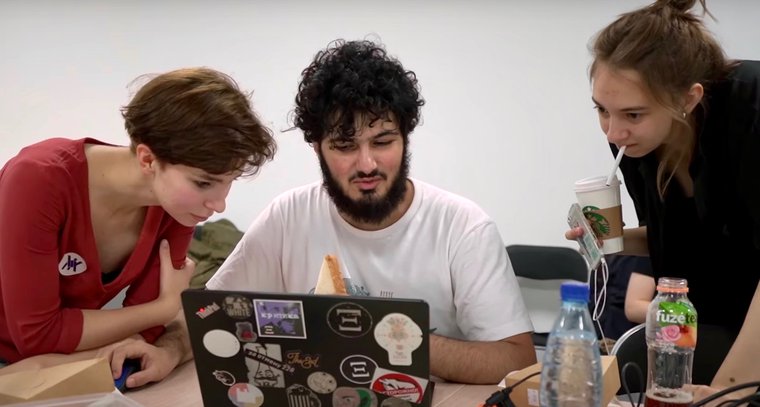 |
Image: Film "DOXA should be here" (Andrey Kiselev)
Russia’s young people, including students, have shot to the fore in recent years, emerging as political subjects both in their own minds and the minds of the public. In response, the authorities have sought to manage away the diffuse and diverse student activism.
The Russian student magazine DOXA first appeared in 2017, and was initially based at Moscow’s Higher School of Economics (HSE), where it became a platform for discussing police violence, sexual harassment, academic censorship and the precarisation of academic work. The magazine takes its name from Plato’s dialogues, where “doxa” refers to commonly-held beliefs or opinions. DOXA was forced out of HSE for political reasons in 2019, but its founders and editors continue with the project.
On 14 April, Russian police searched DOXA’s office and the homes of several editors as part of a criminal investigation into “involving underage persons in actions that could risk their health”. DOXA said that the investigation came in reaction to a video clip they released ahead of nationwide protests on 23 January, after the return of opposition politician Alexey Navalny.
openDemocracy spoke to editors Ekaterina Martynova, Armen Aramyan, Natalia Tyshkevich and Viktor Ershov.
DOXA seems like a left-wing project, even a left-liberal one. Yet your project came out of Moscow’s Higher School of Economics (HSE), which has always been a right-wing university in spirit. Was Doxa created in response to this?
Armen: We have never called ourselves a left-wing publication, and certainly not a left-liberal, nor simply a liberal one. There are people with different views in the editorial team, and the common stance that we form through discussions and reaching a consensus is then transmitted to the outside world.
We write about the problems Russian students have, and it turns out that regardless of our views (many in the editorial office do have leftist views) the language for these problems also happens to be left wing. When you write about discrimination against women, the sexual harassment of female students and female university employees, about work-related issues among teachers – their lack of job security, and increasing precarity – you notice that the criticism of these phenomena is steeped in a left, anti-capitalist and anti-patriarchal language. The upshot is that we also speak in this language, otherwise there is no way we can articulate the problems faced by teachers and students in Russian universities.
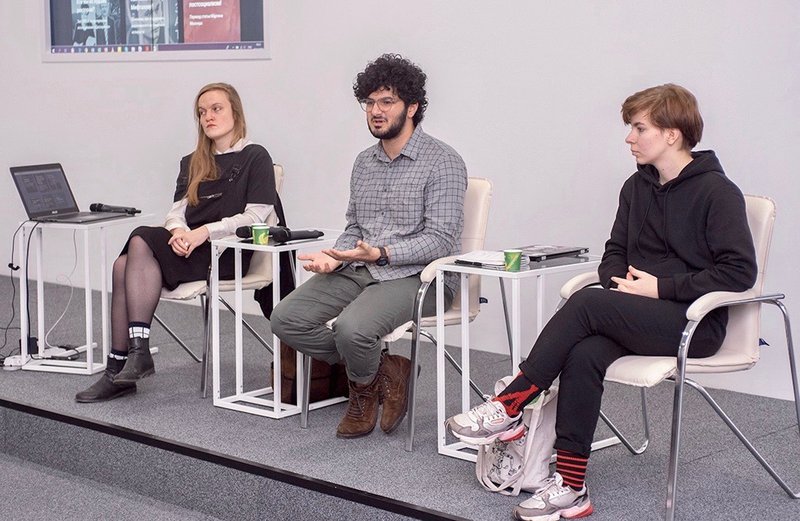
I would say we are certainly a pro-feminist publication. In the current Russian situation where the media are quite conservative, right-wing, we [because of our active pro-feminist position] seem radically left-wing. Though it seems to me that we are simply reproducing our own version of what we see as common sense. Readers can interpret this as they see fit.
Katya: Our colleagues in the media often criticise us for taking a position. The narratives we produce, and our tone, are considered ‘activist’. This is certainly true about some of our projects. But given the dominance of a completely different, conservative tone in the Russian media, belonging to DOXA means being marginal: that is what it feels like. This is also our strength. Not many people are ready to talk about problems in the way we describe and formulate them.
Natalya: We have lively political discussions in our team, the kind that often split into right and left positions. But the agenda itself – to speak on behalf of students who are usually not given a voice – does pertain more to the left end of the political spectrum. It means speaking alongside the oppressed. Everyone here is on board with that.
DOXA now ranges further afield than the HSE alone. For example, you have published stories on sexual harassment at Moscow State University and on repressive measures taken against students at other universities, including in Russia’s regions. At what point did this transition occur?
Armen: We began writing about the problems of the entire student body long before the Higher School of Economics stopped cooperating with us, about a year and a half before. We realised that in Russia there is very little student media that talks about the problems students face. Isolated student media at individual universities cannot cope with this demand because they do not have sufficient resources.
We were officially “kicked out” of HSE for allegedly damaging its relations with other universities. Technically, this was due to a complaint from Natalia Pochinok, head of the Russian State Social University: we covered her administrative work in 2019. Then, the HSE’s Ethics Committee decided that we were ruining the reputation of the university. In addition to our coverage of Pochinok, the commission also cited a satirical article we wrote titled “Five reasons not to enroll at HSE”. Soon after the university stopped supporting DOXA, it stopped financing any student media at all.
What were the five reasons?
Armen: I don’t remember any more, but it’s very funny to read this article nowadays, because in 2021, the reality is completely different. We wrote about the cult of student self-exploitation that existed in HSE, about how the administration ignores the opinion of students. But this year we published an article about political dismissals of staff at HSE over the past five years – and now there are already 15 reasons not to enroll. HSE has effectively ceased to be a liberal university.
The measures taken against students and teachers at HSE are the same as other Russian universities. For any extracurricular activity [e.g. civic or political activity], a student can be sanctioned, including expulsion.For teachers, the most striking example is the dismissal of HSE computer science lecturer Anna Vellikok, after she was detained at a political protest. Vellikok’s employment contract with the university was terminated literally immediately after she was detained. Officially it was due to the fact that she would not be able to fulfil her contractual obligations, as she was under arrest.
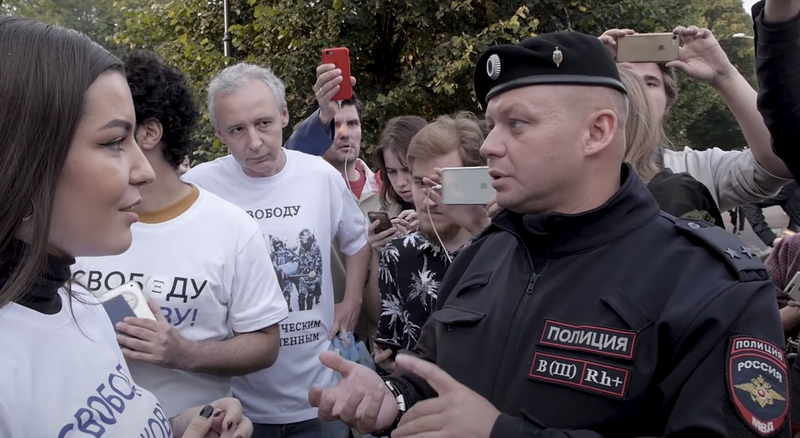
The students are not expelled en masse in this way: it is simpler to apply these measures against teachers. In general, other measures are used, for example, cancelling student events that appear “too politicised” and intimidating event organisers. You don't need to do anything special to intimidate students, just give a few hints in order to kill off any activity at the faculty for a few years. There are so many cases of censorship happening at the HSE Faculty of Communications, Media and Design, which trains journalists, filmmakers, and television producers.
Sometimes expulsions do occur, in one form or another. There was an egregious case with Yegor Zhukov [an opposition blogger] when he entered the Directing and Drama Masters Programme at HSE’s Media Communications Faculty after completing a bachelor’s degree in political science. This programme was closed down because Zhukov was admitted to it, and on this pretext he was forced out of HSE.
In 2021, you launched a project to help students who suffer political repression. Have you been contacted by many people yet? Does it only apply to students, or to anyone at a university?
Armen: This is the second time we launched this project. The first time was in summer 2019, after students and teachers were detained en masse at protest actions. This year, it was triggered by the protests in January and February. Since then, the project has received several hundred applications. Our hotline has been in constant operation: students can call it if they, their acquaintances, friends or relatives have been detained and they do not know what to do. This service is mainly about helping students to pay fines. All in all, fortunately, many similar initiatives have been launched across the country this year, and our service has not been unique.
We also cover detentions and clampdowns against students inside universities. We were able to expose more than 60 universities that in some way or another intimidated students before the January 2021 protests. We also wrote about several expulsions from universities of students who were detained at the protest actions.
Viktor: On 29 January, three students were expelled from Astrakhan State University for participating in protest rallies. Meanwhile, 77% of the dissertation of the university’s rector [former Astrakhan governor Konstantin Markelov], who made this decision, turned out to be plagiarised [according to Dissernet project, which checks dissertations for plagiarism].
But the interesting thing is the fact that a month later Markelov admitted that these expulsions occurred “at the request of the law enforcement agencies”. This is, of course, an isolated case, I have no recollection of any other case of a university expelling students following the new wave of protest.
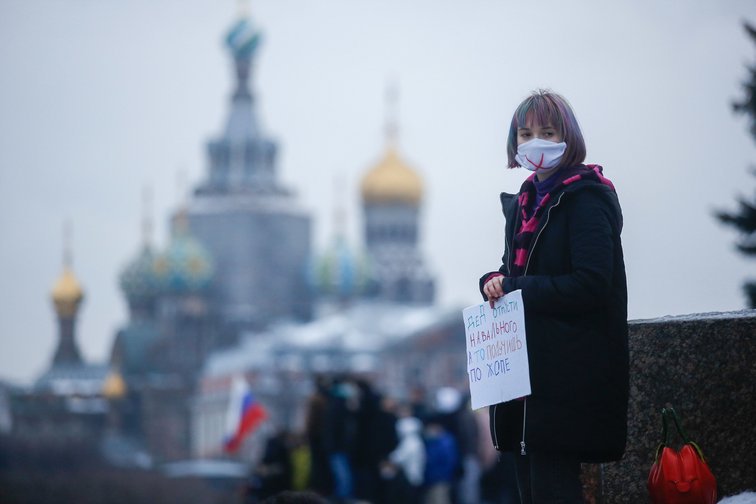
Some universities, on the contrary, are trying to portray themselves as freedom-loving as possible, such as the St Petersburg branch of RANEPA. After we wrote about one of their teachers who discouraged students from attending rallies, the university themselves contacted us and said that they condemn any such behavior by their employees.
Katya: To be more precise in terms of numbers, more than 120 students contacted us, and around 12 students requested financial assistance to pay for fines. We have already paid six fines, the rest are waiting for a final decision. This service is still ongoing, and we plan to carry on operating. After all, the protests will continue.
Viktor: In the summer of 2019 when we talked about the sacking of teachers from HSE, several of them told us – one openly, and the rest anonymously – that the FSB has a “blacklist” of HSE employees who either have to be sacked or are simply not to be employed.
The young people I have spoken to at recent rallies are afraid of two things – expulsion and compulsory military service. Is this a fear that has been deliberately encouraged?
Viktor: It is something hanging in the air, but not something explicitly articulated.
So far, all this remains at the level of isolated cases or such incidents, as in Astrakhan. There was also a very strange case in St Petersburg State University – a student who supported Azat Miftakhov [an MGU mathematics postgraduate student and anarchist activist] was summoned to a commission of three teachers. One of them said right in the middle of it: “I have a feeling that they want to expel you, but I was not privy to this plan.”
"When we enter the political domain, Russian law ceases to apply. In these situations, it is impossible to protect someone 100% from expulsion, but you can make it as difficult and inconvenient as possible"
But compare how many people are detained with the number of expulsions that we know about. Of course, anything can happen at any time, but we do not foresee mass expulsions, only disciplinary measures. So far, the expulsions are a consequence of things perpetrated on an individual basis. They do not seem to be happening in any systematic way.
How is your average Russian student protected from abuses of power, such as the one in Astrakhan?
Viktor: When we enter the political domain, Russian law ceases to apply. In these situations, it is impossible to protect someone 100% from expulsion, but you can make it as difficult and inconvenient as possible. DOXA is one of the establishments that managed to accomplish this. We simply talk about these abuses publicly, and a high-profile case in a single university can become national news. For example, that’s what happened with the sacking of teachers from HSE: it was through us that people found out about the FSB blacklists.
In some universities, student councils are not completely meaningless bodies. They are not super-influential, and one can be often very critical of them, but sometimes they take the side of the students, even if in an insufficiently forthright manner. The Student Council of St Petersburg State University analysed the case above – the student who supported Azat Miftakhov – and announced that they were “concerned about the circumstances of her expulsion”. At least something is better than nothing!
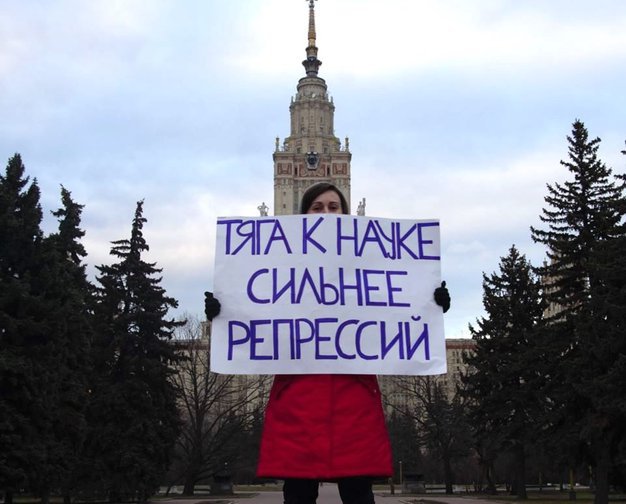
Before the rally on 23 January, the trade union of the St Petersburg Polytechnic University quite openly wrote: “The university will try to protect you if there are problems; no one has the right to expel you for participating in protests. But this is Russia.”
This is a good illustration: some universities are ready to protect their students, but at some point, under a certain level of pressure, they lose sovereignty over their own spaces and decisions. In this sense, it is obvious that no institutional defenсes will help you if you are already under pressure.
Will political repression in universities eventually become a normal part of student life in Russia?
Viktor: The decision on whether or not to clamp down on students is most likely made not in universities, but elsewhere. It is impossible to predict their behaviour. A year ago, no one could have imagined that we would be where we are now. We cannot be sure how many “miraculous revelations are awaiting us”.
It all depends on the political situation in Russia, the desire of people in power to clamp down on students in general, and whether the university leadership will follow a conformist position. We hope that mass expulsions of students for political reasons, which have not occurred now or in the past, won’t happen any time soon.
Armen: I think repression is inevitable. Sooner or later, as the protest steps up, this tool will begin to be used en masse. As we can see in Belarus, there are no limits for universities in this regard. More precisely, there are no levers of public pressure on the university administration, which is built into the bureaucratic power structure. Any rector who refuses to carry out a crackdown on students will simply be replaced by another, as was the case at Belarusian universities.
Previously, in Russian universities the visibility of international cooperation held significant value, improving the quality of education and science, but now all this has been scrapped, in order to keep students and teachers under control.
Katya: My classmates and my friends who are currently students all say that they will now think twice before going out to protest, or before doing something inside their university – whether it’s extra-curricular research, convening a student organisation, or holding an event.There is a sense of tension in the air. The Leviathan seems ready to attack at any time. It is better not to do anything at all: otherwise you do not know how things will turn out. This is self-censorship, students are becoming inhibited, I can see it happening.
Natalya: I was an undergraduate at the time of the Bolotnaya Square protests in 2011-2012, I’m one of the dinosaurs at DOXA. I would say there is a big difference between then and now. Back then no one discussed politics; at most they would wear white ribbons to demonstrate their support for the protest movement. But they were few and far between. I could discuss those protests, maybe, only with individual teachers.
Now almost everyone is discussing politics. The level of politicisation has greatly advanced. Yet it is also true that now it is more difficult to carry out any political actions in the universities. The threats of expulsions are a reaction to the politicisation.
"Russian universities often do not support women. They do not investigate harassment. They do not provide any benefits when women go on maternity leave"
Students are not deterred by this. In the autumn, a banner that said “No to political dismissals!” was hung in one of the HSE buildings, and a similar action was held at the Moscow State Pedagogical University, about the non-payment of scholarships, plus another one in the St Petersburg State Agrarian University.
I think students are less afraid now. My friend participated in one of these actions and said: “Well, they will be expelled – so what?” With the decline in the quality of education in Russia, students are worrying about their status less and less. It is difficult to make any generalisations, I just want to say that there are some students who are fearless.
What about studying itself? Do young people generally still want to go to university?
Viktor: In Russia, a new sense of “student life” is being formed right now, including through our magazine. Before DOXA, there was another student outlet, produced by the team who run Bumaga [a city-wide publication about life in St. Petersburg] That paper closed down in 2012 with the wording: “In Russia, unfortunately, there are only people who study at universities, but there are no students.”
In recent years, it has become evident that Russian students are evolving, that people are aware of themselves as students and behave as students. They understand that they do not just go to university, but they also represent a certain social group. Academia has become more prestigious, a little less boring, a little more fashionable.
Education is also ridding itself of the Soviet gender gap – where boys studied technical subjects, and girls were in the humanities. In my humanities department, there were only four male students who graduated in the past 15 years. But in the last three years, there were five male students each year. They are not ashamed of studying art history, just as girls are not ashamed to study mathematics. Education is being democratised.
If you look at the interests of the DOXA team, then you have the two cultures of science and the arts all mixed up – the philosophy of technology, sociology and big data. Do you need to be in both camps to survive in the modern world?
Katya: In December, I carried out an investigation with my colleagues from DOXA about women in Russian academia: an attempt to collate a large body of data. According to the data we found, there is still an unequal proportion of women and men in the humanities and technical subjects. We found that women do not reach higher positions in academia at the doctoral level.
This subject is rarely discussed. When you study for a bachelor’s degree, you have a sense that there are more women than men – and this is in fact the case. And then, because of reproductive responsibilities and a conservative culture, a woman just does not have the time or is otherwise unable to go further. PhDs, teaching positions, professorships – all these are not easily accessible for women.
Natalya: There is political pressure through threats of expulsions, and there is the shadowy menace of harassment hanging over female students. There are fewer and fewer women as you go up the academic ladder – and this is attributable, among other things, to harassment. Women gradually become less motivated to pursue an academic career. This is happening against the background of the modern conservative turn in Russia, coupled with the bureaucratisation of the university, which increases the overall level of pressure on students and junior teachers.
Katya: Russian universities often do not support women. They do not investigate harassment. They do not provide any benefits when women go on maternity leave. If a female teacher at HSE goes on maternity leave, there starts a preferential publication period, when she does not need to comply with the annual quota on research publications. But Russian academia is arranged such that, prior to pregnancy, a woman has to prepare a reserve body of work. The grace period lasts only a year, while your childcare responsibilities last much longer.
Without publications you remain without additional payments, and this represents quite a large sum. If you sense that there will be no support at all, not even institutional support, you will lose heart, everything seems to be set against you.
Globally, we are seeing higher education require teachers to give more psychological and emotional support to students, increasing commercialisation and greater responsibility placed on teachers for the quality of their students’ work. Are these trends present in Russia? Or are Russian universities, like some other parts of society, isolated from the rest of the world?
Armen: The problem of isolation should be considered comprehensively. There is isolation, but it is connected with the fact that Russian universities are much poorer than many of the world’s successful top-ranking universities. There are not many universities in Russia that can, in principle, cooperate at an international level and adopt international practices.
There is definitely a trend of increasing commercialisation. In Russian universities, the number of people who pay for their education is increasing, while the number of state-funded places has not been reduced, but is not growing either. In general, the number of places for students seems to be growing, but the state budget does not keep up with this growth. These are my intuitive observations that would need to be checked with statistics.
At the same time, the process of turning higher education into a service where “the student is always right” is not happening. In US universities, many teachers feel that they are simply working for students, as in a commercial enterprise. Russian universities are under the fairly direct hierarchical control of local and federal authorities. One cannot say that universities strongly heed student demands.
The logic for the existence of Russian universities is different. In the US, universities aim to attract students, who in turn will bring in a lot of money. Russian universities also have this goal, of course, but there is no shortage of students: Russian state money will still come, and these funds are more important to the economy of the university. There is no special competition between universities.
Katya: The problem with the commercialisation of universities in Russia is that we do not have a system of preferential student loans. I do not know of any cases where a student would take out a loan for their education. But at the same time, a very limited stratum of households can afford paid education at a top university. Access to good higher education remains limited.
I do not have any sense that Russia is following the “psychologisation” trend that you describe. The educational ideology that is being promoted now, the ideology of the self-made student and the researcher, assumes that if the student does not do something on their own, no one will come and suggest to them: “Hi, let’s join forces, apply for this grant, for that programme.”
On the contrary, there is a sense of living in a highly polarised atmosphere. The university says to me: “Let’s spend your entire third year doing only work on projects instead of studying,” and, nevertheless, I have no sense that there is any mentoring support available.
The teacher should impart some skills and offer some support in this situation. The student must convert this support into knowledge production. But these two threads are disconnected – the teacher is overloaded with bureaucratic and personal matters, and the student needs to pass their exams, somehow finding work along the way to feed themselves.
If I want to do something, I look for co-researchers on my own, I search for funding on my own, I search for ideas on my own, I help myself. In technical universities, a different system is already emerging – students come together in research teams, in collectives based on mutual assistance. But to get there, you still need to overcome the barrier of the “self-made student” – first you need to stand alone like a wolf, howl and suffer, and then, maybe, someone will let you join the pack. You still need to be prepared for the fact that you are on your own.

